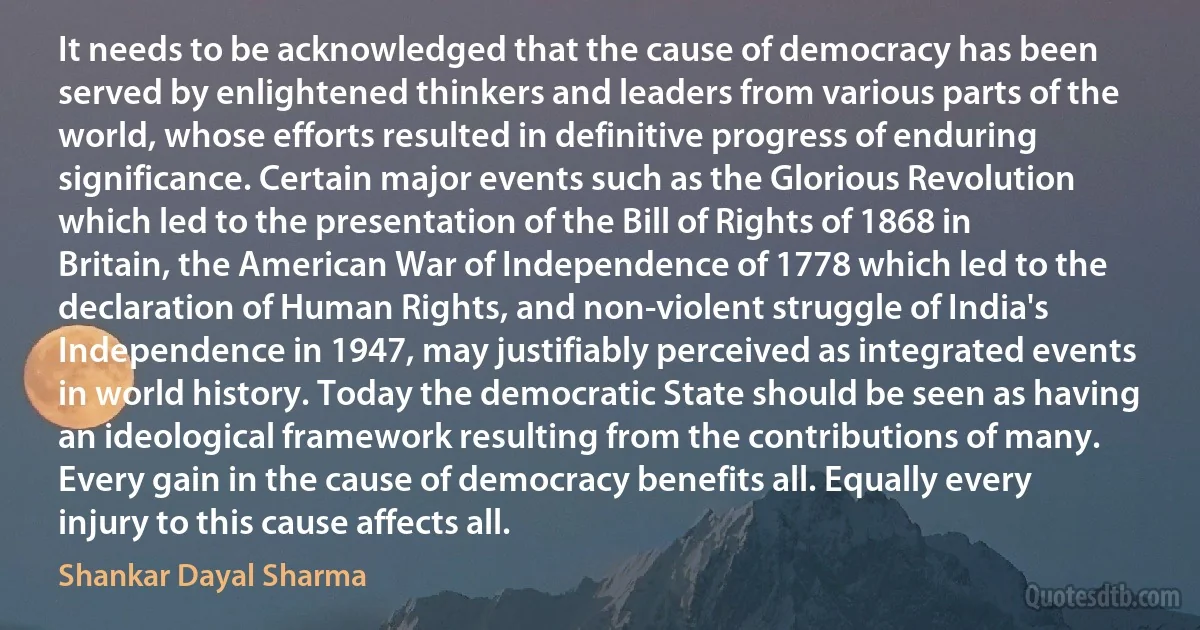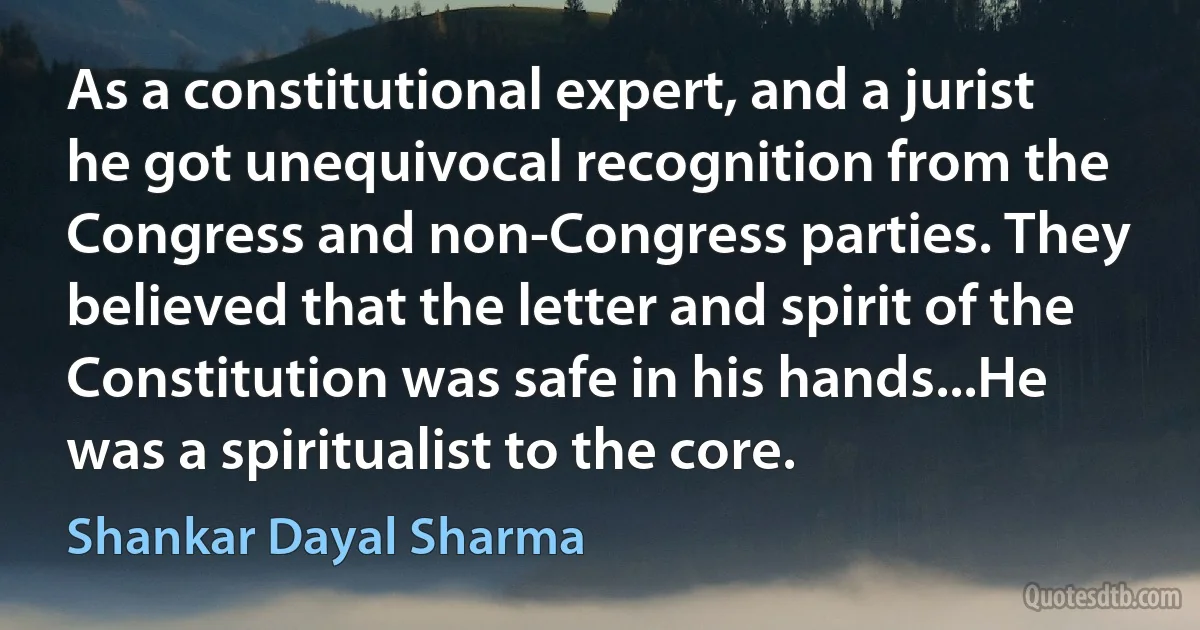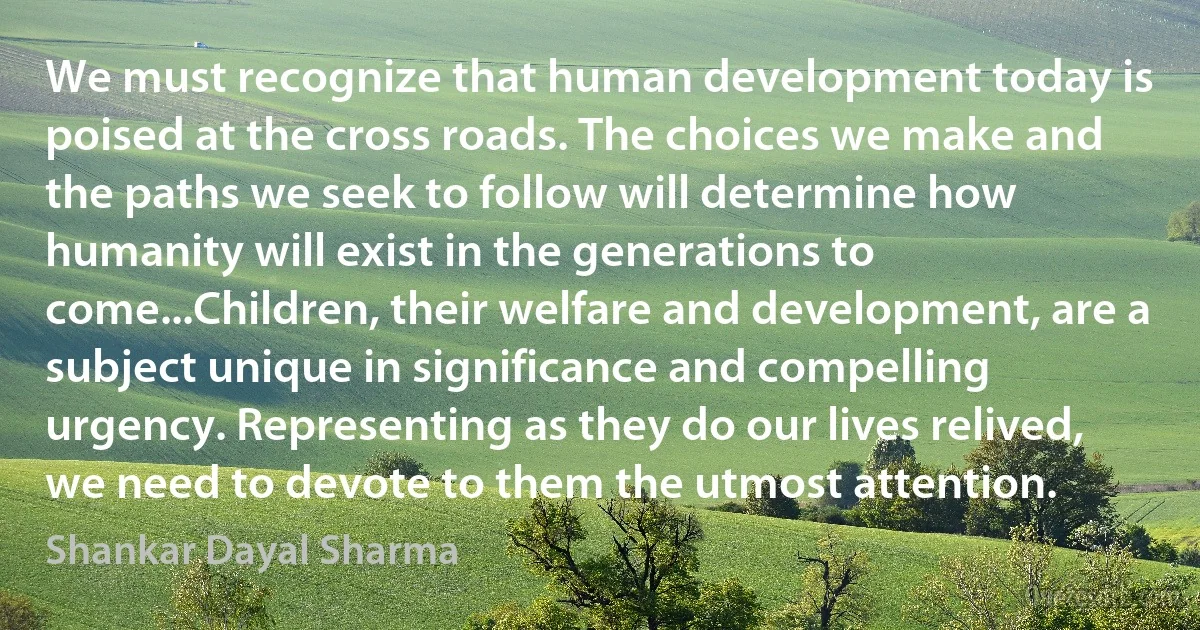Shankar Dayal Sharma quotes
The demand for a Constituent Assembly was intrinsically linked to our larger goal of Freedom and Independence. The resolution for Purna Swaraj in 1929 had aroused great nationalist fervour and galvanized the people to take part with renewed vigour in the Freedom Movement. The clear and unambiguous articulation of this deep-rooted longing of the people of India to be in control of their own destiny contained within itself the idea of a democratic Constitution which would provide a framework for the governance of independent India by the Indian people. Clearly, such a Constitution could only be drawn up by the elected representatives of the people of India. It was from this unassailable logic that the demand for a Constituent Assembly was articulated by Panditji. The proposal was accepted by the Indian National Congress in 1934, whereafter it became a significant part of the nationalist agenda for Independent India.

Shankar Dayal Sharma
There was a sense of mission in the members of the Constituent Assembly to draft a Constitution which would preserve the pluralism and essential oneness, and the unity and integrity of India. Our Constitution ensures that India remains a secular State. People belonging to different religious denominations who are all part of our vibrant pluralistic society, are guaranteed the freedom to practice their own religions. I might add that these Rights under our Constitution are available even to those who are not citizens of India.

Shankar Dayal Sharma
Having been distressed by the performance of the hung Lok Sabhas and the instability caused by the coalition governments during his tenure, when three Prime Ministers changed their hands, he took an unprecedented stand by calling the conference of Governors as also leaders of some political parties to discuss this serious problem facing the nation which had weakened the democratic structure of the country. This action earned him a lot of controversy from different quarters. It was even doubted that he was doing so to earn a second term as President of India.

Shankar Dayal Sharma
A longtime member of the Congress Party, he was its president for a time. He had a doctorate in law from Cambridge. He was elected, with support from Congress and leftist groups, as ninth president of India, that role is largely ceremonial, though its powers include discretion in choosing a prime minister if no party has a parliamentary majority.

Shankar Dayal Sharma
Pandit Jawaharlal Nehru has compelled me to study, among other things, the implications of a Constituent Assembly. When he first introduced it in the Congress resolutions, I reconciled myself to it because of my belief in his superior knowledge of the technicalities of democracy. But I was not free from skepticism. Hard facts have, however, made me a convert and, for that reason perhaps, more enthusiastic than Jawaharlal himself.

Shankar Dayal Sharma
We must all comprehend the importance of unity, the true significance of canons of propriety and the value of having the freedom to voice different viewpoints which, indeed, are the hallmarks of any pluralistic society. As our sages of yore said, our aims are common, our endeavours common, and there are diverse ways to reach our goals.

Shankar Dayal Sharma
The message of India to our neighbourhood and to the rest of the world has been and will be peace, friendship and cooperation. Our commitment from time immemorial has been:
May All secure happiness
May all enjoy good health
May all experiences goodness around them
Let none be in pain or sorrow.

Shankar Dayal Sharma
Already, in the decades before Independence our people were giving thought to their vision of an Independent India. Pandit Motilal Nehru drafted the well-known Nehru Report on the Constitution of free India. The Karachi Session of the Indian National Congress held in March, 1931 adopted the famous Resolution moved by Mahatma Gandhi which contained our charter on Fundamental Rights. It is against this historical backdrop of a long and arduous struggle and the crystallization of our vision of a sovereign, democratic nation that the first session of the Constituent Assembly was held in 1946, when, as Panditji said, we embarked on `the high adventure of giving shape, in the printed and written word, to a nation's dream and aspiration.

Shankar Dayal Sharma
Our Constitution has given us the framework for a strong nation, a Union of States; a nation of harmony between the Union and States and between the various institutions of our democratic polity. We can claim to have achieved significant success in the diverse and inter-connected spheres of democratic governance, our Parliament, the Executive and the Judiciary. The philosophy of the Constitution nurtures a polity where the precepts and practices of democracy can become second nature to the people. Through the elections to eleven Lok Sabhas, the people of India have repeatedly displayed their determination to fulfil their duties as responsible citizens of the Republic.

Shankar Dayal Sharma



